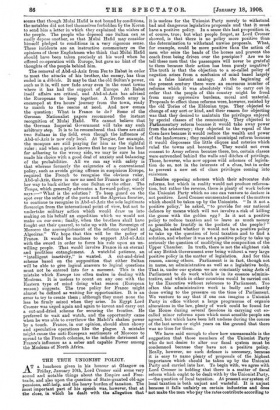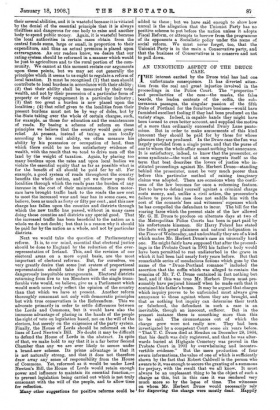THE TRUE UNIONIST POLICY.
AT a luncheon given in his honour at Glasgow on XI_ Friday, January 10th, Lord Cromer said some very sound and notable things about the Empire and Free- trade, and also upon the question of State-granted old-age pensions, self-help, and the heavy burden of taxation. The most important part of his speech was, however, that at the close, in which he dealt with the allegation that - - it is useless for the Unionist Party merely to withstand bad and dangerous legislative proposals and that it must have a positive policy. In a sense this last proposition is, of course, true ; but what people forget, as Lord Cromer showed, is that there is no policy more positive than the determination to withstand unwise proposals. What, for example, could be more positive than the action of men who seize the heads of the horses and prevent the coach from being driven over the precipice ? Are we to tell these men that the passengers will never be grateful to them because their action has been purely negative ? The truth is that the objection to a so-called policy of negation arises from a confusion of mind based largely on a false historic analogy. At the beginning of the present century there were an enormous number of reforms which it was absolutely vital to carry out in order that the people of this country might be freed from many oppressive burdens, moral and material. Proposals to effect these reforms were, however, resisted by the old Tories of the Eldonian type. They objected to change of any sort or kind, and their reason for objecting was that they desired to maintain the privileges enjoyed by special classes of the community. They objected to Parliamentary reform because it would take away power from the aristocracy ; they objected to the repeal of the Corn-laws because it would reduce the wealth and power of the landowners ; they resisted municipal reform because it would dispossess the little cliques and coteries which ruled the towns and boroughs. They would not even consent to Army reform because there, too, certain classes were entrenched behind the walls and ditches of privilege, Those, however, who now oppose wild schemes of legisla- tion do so, not in the interests of a class, but in order to prevent a new set of class privileges coming into existence.
Besides opposing schemes which their advocates dub reforms, but which in reality would not produce reforms- tion, but rather the reverse, there is plenty of work before the Unionist Party which no one can venture to declare is not positive. Lord Cromer enumerated some of the matters which should be taken up by the Unionists. "Is it not a positive policy," he asked, " to provide for our national defence by means which will not involve a risk of killing the goose with the golden egg ? Is it not a positive policy to reduce taxation and to leave as much money as possible to fructify in the pockets of the people ? ' Again, he asked whether it would not be a positive policy to take up the question of local taxation and to find a solution, and whether it was not a positive policy to take up seriously the question of modifying the composition of the Upper Chamber. In truth, there is not the slightest risk of any. British Government ever being without a very large positive policy in the matter of legislation. And for this reason, among others. Parliament is in fact, though not in name, an administrative as well as a. legislative body, That is, under our system we are constantly using Acts of Parliament to do work which is in its essence adminis- trative, and which in other countries would be carried out by the Executive without reference to Parliament. Too often this administrative work is badly and hastily done owing to the pressure on the time of Parliament, We venture to say that if one can imagine a Unionist Party in office without a large programme of organic alterations in the law, plenty of work could be found for the House during several Sessions in carrying out so. called minor reforms upon which most sensible people are agreed, but which have been left undone during the course of the last seven or eight years on the ground that there was no time for them.
We have said enough to show how unreasonable is the suggestion that those members of the Unionist Party who do not desire to alter our fiscal system must be condemned because they have not a positive policy. Really, however, no such defence is necessary, because it is easy to name plenty of proposals of the highest importance which should be taken up by the Unionist Party and carried into law. To begin with, we agree with Lord Cromer in holding that there is a matter of fiscal reform which ought to be dealt with by the Unionist Party, —the question of local taxation. At present our system of local taxation is both unjust and wasteful. It is unjust because it falls unfairly on certain industries and does not make the men who paythe rates contribute according to their several abilities, and it is wasteful because it is vitiated by the denial of the essential principle that it is always thriftless and dangerous for one body to raise and. another body to spend public money. Again, it is wasteful because the local authorities in certain cases obtain from the central funds sums, large or small, in proportion to their expenditure, and thus an actual premium is placed upon extravagance. As our readers know, we desire that our rating system should be reformed in a manner which would be just to agriculture and. to the rural portion of the com- munity. We cannot at this moment restate our arguments upon these points, but we may set out generally the principles which it seems to us ought to regulate a reform of local taxation. It must be recognised (1) that men should contribute to local burdens in accordance with their ability ; (2) that their ability shall be measured. by their total wealth, and not by their possession of a particular form of property or their engagement in a particular industry ; (3) that too great a burden is now placed upon the localities ; (4) that relief given to the localities from their present burdens must not be by way of doles, but by the State taking over the whole of certain charges, such, for example, as those for education and the maintenance of roads. By basing a scheme of reform on these principles we believe that the country would gain great relief. At present, instead of taxing a man locally according to his real ability, we often measure his ability by his possession or occupation of land, than which there could be no less satisfactory evidence of wealth, with the result that we tend to drive men off the land by the weight of taxation. Again, by placing too many burdens upon the rates and upon local bodies we violate the essential equity that as far as possible what is for the benefit of all should be paid for by all. For example, a good system of roads throughout the country benefits the whole nation, and yet we throw upon the localities through which the roads pass the burden of any increase in the cost of their maintenance. Since motor- cars have brought traffic back to the roads the new cost to meet the increased. wear and tear has in some cases, we believe, been as much as forty or fifty per cent., and this new charge has fallen upon the counties and districts through which the new traffic has passed, without in many cases doing those counties and districts any special good. That the increased traffic has been beneficial to the nation as a whole we do not doubt; but that is a reason why it should be paid for by the nation as a whole, and. not by particular districts.
Next we would take the question of Parliamentary reform. It is, to our mind, essential that electoral justice should be done to England by the reduction of the over- representation of Ireland. This, and the revision of our electoral areas on a more equal basis, are the most important of electoral reforms. But, for ourselves, we very greatly desire that some just system of proportional representation should take the place of our present dangerously inequitable arrangements. Electoral districts returning from five to ten Members with the single trans- ferable vote would, we believe, give us a Parliament which would much more truly reflect the opinion of the country than that which we have at present. Another reform thoroughly consonant not only with democratic principles but with true conservatism is the Referendum. This we advocate primarily in order to settle differences between the Lords and Commons, but it would. have also the immense advantage of placing in the hands of the people the right of veto on legislation based, not on the will of the electors, but merely on the exigencies of the party system. Finally, the House of Lords should be reformed on the lines of Lord Newton's Bill. No doubt it may be difficult to defend the House of Lords in the abstract. In spite of that, we make bold to say that it is a far better Second Chamber than any we are ever likely to secure under a brand-new scheme. Its prime advantage is that it is not naturally strong, and that it does not therefore draw away any sense of responsibility from the House of Commons. Yet, reformed as it would be under Lord Newton's Bill, the House of Lords would retain enough power and influence to maintain its essential function,— to prevent legislation being carried out which is not truly consonant with the will of the people, and to allow time for reflection.
Many other suggestions for positive reforms could be added to these ; but we have said enough to show how unreal is the allegation that the Unionist Party has no positive scheme to put before the nation unless it adopts Fiscal Reform, or attempts to borrow from the programme of its opponents a Socialistic policy under the name of social reform. We must never forget, too, that the Unionist Party is in the main a Conservative party, and that the business of Conservatives is to conserve and not to pull down.







































 Previous page
Previous page